| Listing 1 - 10 of 28 | << page >> |
Sort by
|
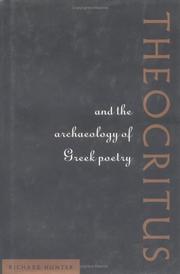
ISBN: 0521560403 0521035260 0511627378 0511821654 9780521560405 9780511627378 9780521035262 Year: 1996 Publisher: Cambridge Cambridge University Press
Abstract | Keywords | Export | Availability | Bookmark
 Loading...
Loading...Choose an application
- Reference Manager
- EndNote
- RefWorks (Direct export to RefWorks)
The poems of Theocritus are our best witness to a brilliant poetic culture that flourished in the first half of the third century BC. This book considers the context from which these poems grew and, in particular, the manner in which they engage with and recreate the poetic forms of the Greek archaic age. The focus is not on the familiar bucolic poems of Theocritus, but on the hymns, mimes and erotic poems of the second half of the corpus. Recent papyri have greatly increased our understanding of how Theocritus read archaic poetry, and these discoveries are fully exploited in a set of readings which will change the way we look at Hellenistic poetry.
Genres [Letterkundige ] --- Genres [Literaire ] --- Genres littéraires --- Letterkundige genres --- Literaire genres --- Literary form --- Poetics --- Poétique --- Poëtica --- Greek poetry, Hellenistic --- Poésie grecque hellénistique --- History and criticism --- Histoire et critique --- Theocritus --- Greek influences --- -Theocritus --- Literature --- Knowledge --- -Greek poetry, Hellenistic --- Pastoral poetry, Greek --- Greek influences. --- History and criticism. --- History --- Theocritus. --- Literature. --- Poésie grecque hellénistique --- Greek poetry [Hellenistic ] --- Egypt --- Alexandria (Egypt) --- Theocritus. - Idylls. --- Greek poetry, Hellenistic - Egypt - Alexandria - History and criticism. --- Greek poetry, Hellenistic - Greek influences. --- Arts and Humanities --- Greek poetry, Hellenistic - Greek influences --- Greek poetry, Hellenistic - History and criticism - Egypt - - Alexandria --- -Poetics --- Theocritus - - Literature - Knowledge --- Hellenistic Greek poetry --- Greek literature, Hellenistic --- Théocrite --- Theokritos
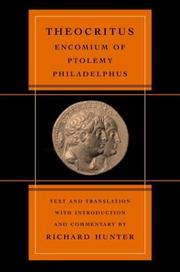
ISBN: 0520235606 1282356968 0520929373 9786612356964 1597345962 9780520929371 1417525665 9781417525669 9780520235601 Year: 2003 Volume: 39 Publisher: Berkeley University of California Press
Abstract | Keywords | Export | Availability | Bookmark
 Loading...
Loading...Choose an application
- Reference Manager
- EndNote
- RefWorks (Direct export to RefWorks)
Under Ptolemy II Philadelphus, who ruled Egypt in the middle of the third century B.C.E., Alexandria became the brilliant multicultural capital of the Greek world. Theocritus's poem in praise of Philadelphus-at once a Greek king and an Egyptian pharaoh-is the only extended poetic tribute to this extraordinary ruler that survives. Combining the Greek text, an English translation, a full line-by-line commentary, and extensive introductory studies of the poem's historical and literary context, this volume also offers a wide-ranging and far-reaching consideration of the workings and representation of poetic patronage in the Ptolemaic age. In particular, the book explores the subtle and complex links among Theocritus's poem, modes of praise drawn from both Greek and Egyptian traditions, and the subsequent flowering of Latin poetry in the Augustan age. As the first detailed account of this important poem to show how Theocritus might have drawn on the pharaonic traditions of Egypt as well as earlier Greek poetry, this book affords unique insight into how praise poetry for Ptolemy and his wife may have helped to negotiate the adaptation of Greek culture that changed conditions of the new Hellenistic world. Invaluable for its clear translation and its commentary on genre, dialect, diction, and historical reference in relation to Theocritus's Encomium, the book is also significant for what it reveals about the poem's cultural and social contexts and about Theocritus' devices for addressing his several readerships. COVER IMAGE: The image on the front cover of this book is incorrectly identified on the jacket flap. The correct caption is: Gold Oktadrachm depicting Ptolemy II and Arsinoe (mid-third century BCE; by permission of the Museum of Fine Arts, Boston).
Ptolemy II Philadelphus, King of Egypt --- Theocritus --- Ptolemy --- Ptolemaeus --- Ptolemy II Philadelphus --- Poetry --- LITERARY CRITICISM / Ancient & Classical. --- alexandria. --- ancient egypt. --- ancient greece. --- aristophanes. --- arsinoe ii. --- art. --- augustan poetry. --- classical studies. --- clouds. --- egypt. --- encomium. --- genre studies. --- greek culture. --- greek poetry. --- greek world. --- hellenism. --- hellenistic poetry. --- hellenistic world. --- heracles. --- homeric hymn. --- hymn. --- king. --- latin poetry. --- literary criticism. --- monarchy. --- mythology. --- patronage. --- patrons. --- pharaoh. --- pharaonic traditions. --- philadelphus. --- pithom stele. --- poetic meter. --- poetic tribute. --- poetry. --- poets. --- praise. --- ptolemaic dynasty. --- ptolemy ii. --- reign. --- ruler. --- theocritus. --- third century. --- zeus.
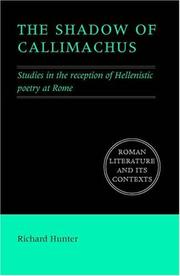
ISBN: 0521691796 9780521871181 0521871182 9780521691796 9780511618499 110717189X 0511260962 0511261535 0511320469 0511618492 1280749512 051125976X 0511260415 9780511261534 9780511259760 9780511260964 9781280749513 9780511320460 9780511260414 Year: 2006 Volume: *11 Publisher: Cambridge Cambridge University Press
Abstract | Keywords | Export | Availability | Bookmark
 Loading...
Loading...Choose an application
- Reference Manager
- EndNote
- RefWorks (Direct export to RefWorks)
Through a series of critical readings this book builds a picture of the Roman reaction to, and adoption of, the Greek poetry of the last three pre-Christian centuries. Although the poetry of the greatest figure of Greek poetry after Alexander, Callimachus of Cyrene, and his contemporaries stands at the heart of the book, the individual studies embrace the full scope of what remains of Hellenistic poetry, both high literary productions and the more marginal poetry, such as that in honour of the great goddess Isis. The singularity of the poetry of Catullus and Virgil, of Horace and the elegists, emerges as more rich and complex than has hitherto been appreciated. Individual studies concern the poets' declared attitudes to their own work, the figure of Dionysus/Bacchus and the poetry of world conquest, the creation of similes, and the conversion of Greek bucolic into Latin pastoral.
Greek poetry, Hellenistic --- Poésie grecque hellénistique --- Callimachus --- Appreciation --- Poésie grecque hellénistique --- Callimachus Cyrenaeus --- Callimaco --- Callimaque --- Kallimachus --- Kallimachos --- Kallimachos van Kyrene --- Arts and Humanities --- History --- Kallimakh --- Kālīmākhūs al-Qūrīnī --- Qūrīnī, Kālīmākhūs --- Calímaco --- Kallimach --- Καλλίμαχος
Book
ISBN: 9780521519854 0521519853 9780511729997 9780511729072 0511729073 0511846932 9780511846939 1282619756 9781282619753 9786612619755 6612619759 0511728123 9780511728129 0511725779 9780511725777 0511724365 9780511724367 0511727178 9780511727177 110720724X 110846047X 0511729995 Year: 2009 Publisher: Cambridge Cambridge university press
Abstract | Keywords | Export | Availability | Bookmark
 Loading...
Loading...Choose an application
- Reference Manager
- EndNote
- RefWorks (Direct export to RefWorks)
Through a series of innovative critical readings Richard Hunter builds a picture of how the ancients discussed the meaning of literary works and their importance in society. He pays particular attention to the interplay of criticism and creativity by not treating criticism in isolation from the works which the critics discussed. Attention is given both to the development of a history of criticism, as far as our sources allow, and to the constant recurrence of similar themes across the centuries. At the head of the book stands the contest of Aeschylus and Euripides in Aristophanes' Frogs which foreshadows more of the subsequent critical tradition than is often realised. Other chapters are devoted to ancient reflection on Greek and Roman comedy, to the Augustan critic Dionysius of Halicarnassus, to 'Longinus', On the Sublime, and to Plutarch. All Greek and Latin is translated.
Greek literature --- History and criticism. --- Appreciation. --- Appreciation --- History and criticism --- Arts and Humanities --- History
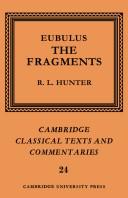
ISBN: 0521244366 9780521244367 Year: 1983 Volume: 24 Publisher: Cambridge ; New York, NY : Cambridge University Press,
Abstract | Keywords | Export | Availability | Bookmark
 Loading...
Loading...Choose an application
- Reference Manager
- EndNote
- RefWorks (Direct export to RefWorks)

ISBN: 0521254523 0521041376 1139881582 1107712645 1107714540 1107297958 1107715881 110772001X 9780521254526 9781107297951 9780521041379 Year: 1983 Volume: *82 Publisher: Cambridge
Abstract | Keywords | Export | Availability | Bookmark
 Loading...
Loading...Choose an application
- Reference Manager
- EndNote
- RefWorks (Direct export to RefWorks)
This 1983 book provides a serious modern literary treatment of perhaps the best known of all surviving works of ancient Greek fiction. Dr Hunter demonstrates the sophistication of this pastoral romance, a sophistication which he maintains has often been assumed but never properly discussed. Evidence for the identity of the author and the date of composition are also considered.
Love stories, Greek --- Daphnis (Greek mythology) in literature --- History and criticism --- Longus --- Daphnis (Greek mythology) in literature. --- History and criticism. --- Longus. --- 875-3 --- -875-3 Griekse literatuur: proza --- Griekse literatuur: proza --- Greek romance fiction --- Greek fiction --- Longos --- Daphnis (Mythologie grecque) dans la littérature --- 875-3 Griekse literatuur: proza --- Daphnis --- In literature. --- Love stories, Greek - History and criticism --- Longus. - Daphnis and Chloe --- Romance fiction, Greek --- Dafni --- Dafnis --- Dafno --- Daphnisz --- Δάφνις --- Дафнис --- Дафніс --- דפניס --- Daphnis (Greek mythology)--in literature. --- Romance-language fiction, Greek
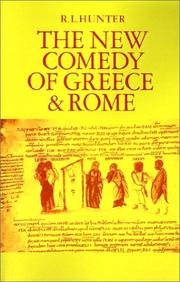
ISBN: 0521316529 0521303648 051162736X 9780521316521 9780511627361 9780521303644 Year: 1985 Publisher: Cambridge Cambridge University press
Abstract | Keywords | Export | Availability | Bookmark
 Loading...
Loading...Choose an application
- Reference Manager
- EndNote
- RefWorks (Direct export to RefWorks)
In writing this book on the plays of New Comedy the author's aim is to fill a gap in the existing literature by concentrating on what one might look for in watching and reading these plays and why such an exercise might be pleasurable. The social comedy of Menander, Plautus and Terence provided a style of comic drama which was to prove the root of all subsequent western comedy. Dr Hunter gives a literary account of this drama, placing it in its ancient context and then ranging over a number of specific topics and themes: the dramatic craft of the poets, their exploration of how to give variety to stereotyped plots and characters, the presentation of women, the use of language and themes from tragedy, the place of moralising and philosophy. All Greek and Latin is translated.
Classical drama (Comedy) --- History and criticism. --- 871-22 --- 875-22 --- -Latijnse literatuur: comedie --- Griekse literatuur: comedie --- -875-22 Griekse literatuur: comedie --- 871-22 Latijnse literatuur: comedie --- Latijnse literatuur: comedie --- Classical Latin literature --- Classical Greek literature --- Drama --- 875-22 Griekse literatuur: comedie --- History and criticism --- Arts and Humanities --- History --- Classical drama (Comedy) - History and criticism.
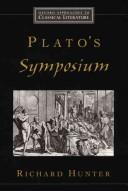
ISBN: 0195160797 0195160800 9780195160796 9780195160802 Year: 2004 Volume: *1 Publisher: New York (N.Y.): Oxford university press
Abstract | Keywords | Export | Availability | Bookmark
 Loading...
Loading...Choose an application
- Reference Manager
- EndNote
- RefWorks (Direct export to RefWorks)
Plato. --- Plato. - Symposium --- Platon
Book
ISBN: 1107728088 1107724074 1107730449 1107732190 1107728681 1107110815 1107721067 1107723345 9781107732193 9781107724075 9781107110816 9781107624979 1107624975 9781107046900 1107046904 9781107721067 9781107723344 9781107728080 9781107730441 9781107728684 Year: 2014 Publisher: Cambridge Cambridge University Press
Abstract | Keywords | Export | Availability | Bookmark
 Loading...
Loading...Choose an application
- Reference Manager
- EndNote
- RefWorks (Direct export to RefWorks)
This book selects central texts illustrating the literary reception of Hesiod's Works and Days in antiquity and considers how these moments were crucial in fashioning the idea of 'didactic literature'. A central chapter considers the development of ancient ideas about didactic poetry, relying not so much on explicit critical theory as on how Hesiod was read and used from the earliest period of reception onwards. Other chapters consider Hesiodic reception in the archaic poetry of Alcaeus and Simonides, in the classical prose of Plato, Xenophon and Isocrates, in the Aesopic tradition, and in the imperial prose of Dio Chrysostom and Lucian; there is also a groundbreaking study of Plutarch's extensive commentary on the Works and Days and an account of ancient ideas of Hesiod's linguistic style. This is a major and innovative contribution to the study of Hesiod's remarkable poem and to the Greek literary engagement with the past.
Greek literature --- History and criticism. --- Hesiod. --- Plutarch. --- Plutarco --- Plutarque --- Ploutarchos --- Ploetarchos --- Plutarch --- Plutarchus --- Plutarkh --- Plutarkhus --- Plutarchus, --- Plutarch, --- Blūtārkhūs --- Плутарх --- Плутах --- Plutarh --- פלוטארכוס --- پلوتارخ --- Πλούταρχος, --- Pseudo-Plutarch --- Plutarkhosz --- Plutarchus Chaeronensis --- Greek literature. --- LITERARY CRITICISM --- POETRY --- Rezeption. --- Poetry. --- Ancient, Classical & Medieval. --- Hesiodus, --- Works and days (Hesiod).
Book
ISBN: 9781108428316 9781108604277 9781108449281 1108602010 1108583849 1108604277 1108428312 Year: 2018 Publisher: Cambridge, England : Cambridge University Press,
Abstract | Keywords | Export | Availability | Bookmark
 Loading...
Loading...Choose an application
- Reference Manager
- EndNote
- RefWorks (Direct export to RefWorks)
Homer was the greatest and most influential Greek poet. In this book, Richard Hunter explores central themes in the poems' reception in antiquity, paying particular attention to Homer's importance in shaping ancient culture. Subjects include the geographical and educational breadth of Homeric reception, the literary and theological influence of Homer's depiction of the gods, Homeric poetry and sympotic culture, scholarly and rhetorical approaches to Homer, Homer in the satires of Plutarch and Lucian, and how Homer shaped ideas about the power of music and song. This is a major and innovative contribution to the study of the dominant literary force in Greek culture and of the Greek literary engagement with the past. Through the study of their influence and reception, this book also sheds rich light on the Homeric poems themselves. All Greek and Latin are translated.
Antike. --- Influence (Literary, artistic, etc.). --- Rezeption. --- Homer --- Homer. --- Homerus, --- Influence. --- Iliad (Homer). --- Odyssey (Homer). --- Hóiméar --- Hūmīrūs --- Homeros --- Gomer --- Omir --- Omer --- Omero --- Ho-ma --- Homa --- Homérosz --- האמער --- הומירוס --- הומר --- הומרוס --- هومر --- هوميروس --- 荷马 --- Ὅμηρος --- Гамэр --- Hamėr --- Омир --- Homère --- Homero --- 호메로스 --- Homerosŭ --- Homērs --- Homeras --- Хомер --- ホメーロス --- ホメロス --- Гомер --- Homeri --- Hema --- Pseudo-Homer --- Pseudo Omero --- Homerus. --- E-books --- Homerus
| Listing 1 - 10 of 28 | << page >> |
Sort by
|

 Search
Search Feedback
Feedback About UniCat
About UniCat  Help
Help News
News